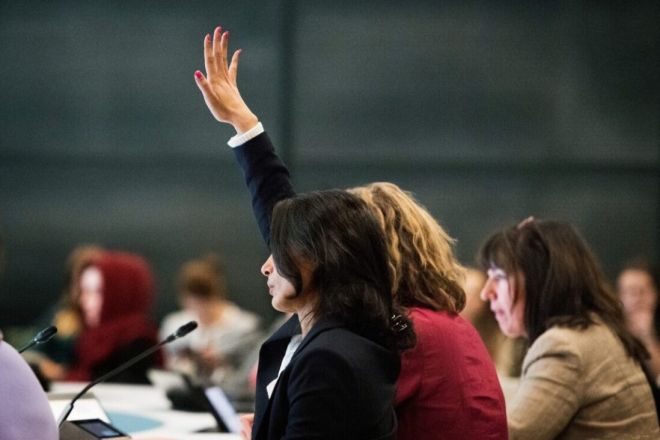
The Dutch Minister for Foreign Trade and Development, Reinette Klever, has announced massive budget cuts to civil society organisations. She is creating high barriers for civil society organisations that advocate globally for democratic processes, international rule of law, and human rights, including women's rights and gender equality. All funding for implementing the international Women, Peace and Security agenda has been eliminated.
This cabinet's choice leads to an unprecedented disruption of the civil society movement that advocates for democracy, rule of law, and human rights, and works on inclusive peace and security processes, reconstruction, and climate adaptation. Director Anne-Floor Dekker states: "To put it mildly, this is a peculiar decision in a time of growing ultraconservatism, increasing violent conflict, and more anti-democratic regimes."
Impact of these devastating cuts
When the new cabinet took office, it was announced that they wanted to cut development cooperation funding. However, the extent and manner of these cuts are unprecedented. Only one-third of the current budget that also goes to local organisations will remain. National and local civil society organisations must contribute 50% of their own resources. Only service delivery and dialogue may still be funded. Director Anne-Floor Dekker: "Women human rights defenders specifically seek international support for their work and desperately need international lobbying and advocacy for their protection. Parliament wanted the cabinet to protect the work of women human rights defenders. This approach will not achieve that."
In recent years, autocratic regimes have increased exponentially and grown stronger, including in Europe and the US. The anti-gender movement is gaining ground - also in the global North. The number of violent conflicts is rising. Civil society organisations and human rights defenders are being attacked, face repressive legislation, and are divided and isolated through funding shortages and impossible funding requirements.
Increasingly, organisations that advocate for democratic processes, international legal order, and human rights, including women's rights and gender equality, stand alone. Countries that previously led in flexible funding for women human rights defenders and women peacebuilders, enabling them to stand up against repressive regimes at risk to their own lives, have withdrawn their support. Sweden (SIDA) is an example of this. After Trump's re-election, it is likely that the US (USAID) will also stop supporting work on women's rights and gender equality, among others. During his first term, he banned safe abortion care and education.
International Cooperation is crucial
Joint lobbying and advocacy by civil society organisations in the global South and North serves a crucial function: groups that stand alone and organisations that are not part of the power structure desperately need international support from like-minded civil society organisations with long-term commitments. Think of the women in Afghanistan, Iraq, and Myanmar. Or the survivors of sexual violence in Sudan. With international partners, they exchange signals about human rights violations and the rise of ultraconservative and violent regimes. They exchange strategies about effective peacebuilding, humanitarian aid, and human rights defence.
This knowledge is shared at international decision-making forums, such as the Human Rights Council and the Security Council of the United Nations. For local organisations in the global South, it is almost impossible to gain access to international decision-making processes such as at the United Nations, but also Brussels and The Hague. Cooperation with other civil society organisations based in the global North increases access, and often makes that access safer. For example, for women human rights defenders, youth, and local communities advocating for their environment, who want to participate in peace talks or raise human rights violations.
Where it's too dangerous for local human rights defenders and organisations because they are threatened by local authorities or extremist groups, support from Dutch civil society organisations, among others, is key. They offer protection and inform Dutch ministries and members of parliament about the local situation. They also inform the Dutch government and politicians about the impact of Dutch foreign policy. This way, the Dutch government is also held accountable to its own international commitments.
With the announced cuts, the international civil society movement that advocates for democratic processes, international legal order, and human rights - including gender equality and women's rights - will be severely restricted in their operating space. Director Anne-Floor Dekker: "These cuts actually play into the hands of ultraconservative and autocratic movements, rather than countering them. This is exactly the wrong action at exactly the wrong time."